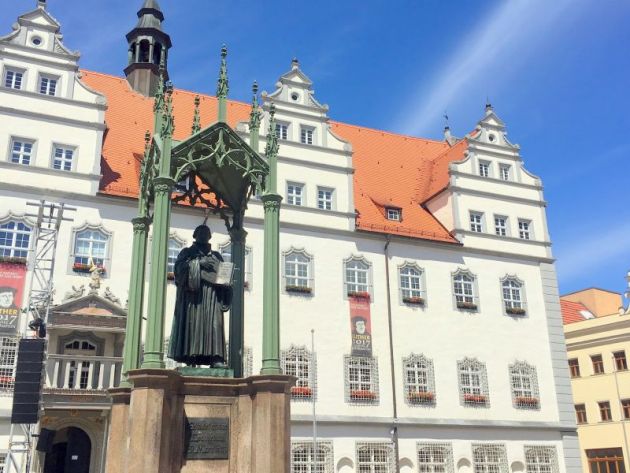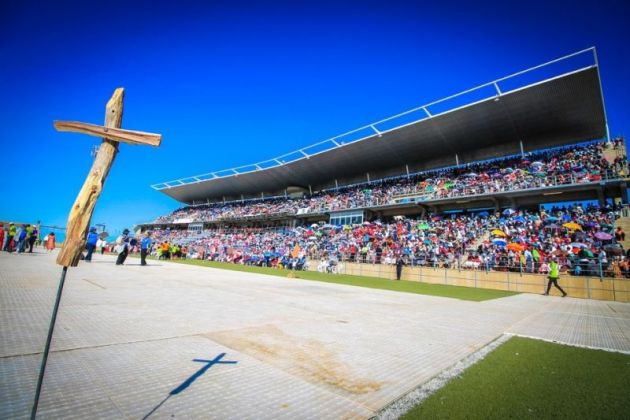500 years after the Reformation began Christianity has come closer, but is still divided.

WITTENBERG, Germany – Five hundred years after the 16th century Reformer Martin Luther is said to have nailed his epoch-changing 95 protests to a church door in the eastern German town of Wittenberg, Catholics and Protestants have been through bitter centuries of conflict, but finally seem to be getting on a bit better.
Still, are Christians getting on as well as they could?
The Atlantic carried a piece on Oct. 29 headlined, "Why Can't Christians Get Along, 500 Years After the Reformation?"
Writer Emma Green wrote that the presiding bishop of the Evangelical Lutheran Church in America, Elizabeth Eaton "is in a bit of a bind."
Luther's dramatic action decrying the Catholic Church's abusive sale of indulgences, or reprieves from punishment for sins led to the flowering of Protestantism and its many distinct denominational traditions, including the Evangelical Lutheran Church in America.
"The thing is, 'that was not good for the church,' Eaton said, referring to the global body of Christian believers. The New Testament calls for followers of Jesus to be 'completely one.' By Luther's time, Christianity had been split from East to West as the Orthodox and Roman Catholic Churches parted ways. Within those traditions, dissidents had already formed a number of prominent sects. The Protestant Reformation catalyzed further breakdown."
Luther, who had been a Catholic priest led the breach with the 16th-century Catholic papacy.
Still Protestants, Lutherans and Catholics are commemorating the historic day around the world in ecumenical services with his actions at the Schlosskirche in the town east of Berlin where he worked.
Over the past year Protestants, Lutherans and Catholics have commemorated the historic day around the world in ecumenical services, with Pope Francis joining in a year ago in Sweden.
Within days of Luther posting his theses they had been reprinted in Nuremberg, Leipzig and Basel and the printing presses played an important role in spreading the views of Luther and other Reformers.
Their movement which became known as the Reformation broke the dominant position of the Catholic Church on Christianity.
It also set in motion not only the Reformation but centuries of bloody and violent religious wars and persecution between the various churches that emerged from the schism.
The Anglican bishop of Leeds Nick Baines, a regular visitor to Wittenberg wrote last month, "Sitting in the Schlosskirche yesterday morning, looking at Luther's tomb, I was very conscious that we can't always control the consequences of the decisions we make.
"The monk of Erfurt changed the world in ways he could never have imagined when he found Paul's letter to the Romans opening his heart and mind to the riches of God's unmerited love.
"Not only a revolution in the church, but political ructions, too, that too often led to bloodshed on a huge scale. I wonder what he would have made of it today, if he had known what he was about to unleash."
Baines blogged, "Wittenberg is where 500 years ago an angry monk got fed up and started a row with the Pope. Martin Luther triggered the Reformation, and the Reformation changed Europe and the world for ever."
One of the highlights of the end of the Reformation Year will be a service in London's Westminster Abbey on Oct. 31.
There the Archbishop of Canterbury, Justin Welby will present copies of an Anglican Consultative Council resolution to the Roman Catholic Church and the Lutheran World Federation. The resolution was adopted in Lusaka, Zambia in April 2016, and stated that the Anglican Church "welcomed and affirmed" the substance of the Joint Declaration.
The Anglican Communion's director of unity, faith and order, Canon John Gibaut, told Anglican News: "In our separate bilateral dialogues with both the Catholic Church and the communion of churches in the Lutheran World Federation, Anglicans have explored the questions of justification, and are agreed on the essential aspects of our salvation in Christ.
"During the historic 2017 anniversary, Anglicans rejoice in the extraordinary achievement that the Joint Declaration on the Doctrine of Justification represents as a sign of healing after 500 years of division."
The service will be attended by the general-secretary of the Lutheran World Federation Rev. Martin Junge, the primate of Anglicans worldwide the Archbishop of Canterbury Justin Welby and representatives of the Vatican.
JOINT DECLARATION
It will make the Anglican Church the fifth Church to join the Joint Declaration on Justification (JDDJ). The pivotal Joint Declaration was adopted by the World Methodist Council in July 2006 and by the World Communion of Reformed Churches (WCRC) in July 2017.
In July Pope Francis hailed the signing saying "May it mark a new stage of fellowship and cooperation in the service of justice and peace in our human family."
On Oct. 31, 1999 in the German city of Augsburg the JDDJ was signed by the Lutheran World Federation (LWF) and the Catholic Church.
It followed decades of extensive ecumenical dialogue between the Catholic Churches Pontifical Council for Promoting Christian Unity and the Lutheran World Federation.
The signing brought to an end nearly 500 years of strife.
As Cardinal Walter Kasper and the former general-secretary of the Lutheran World Federation Rev. Ishmael Noko hugged each other after signing the declaration, the church erupted in spontaneous applause.
In Lund Noko said "Now if I look back I realized that we all worked together despite setbacks and that a spirit of friendship developed if we did not have that it would have been very difficult to hold together."
LUND
The agreement paved the way for closer ecumenical relationships between the Catholics and the Lutherans culminating in Pope Francis travelling to Sweden in 2016 for the start of the activities to commemorate the 500th anniversary of the Reformation.
In the 11th century Lutheran Cathedral in Lund, originally built as a Catholic Church, the Pope in the presence of the King and Queen of Sweden and other dignitaries celebrated a service with representatives from the Lutheran World Federation.
Pope Francis said that Catholics and Lutherans must "look with love and honesty at our past, recognizing error and seeking forgiveness."
The issue of shared Communion however still divides the churches.
Rev. Martin Junge, general secretary of the Lutheran World Federation in the Lund Cathedral, expressed his hope for shared Communion.
A joint statement signed in Lund by Pope Francis and Bishop Munib Younan, president of the Lutheran World Federation, said, "Many members of our communities yearn to receive the Eucharist at one table as the concrete expression of full unity."
WITTENBERG
In 2009, 10 years after the JDDJ was signed Cardinal Kasper traveled to Luther's Wittenberg to plant the first of 500 trees in the Luther Memorial Garden.
The 16th-century events, "divided our people and divided the Church," said Kasper. "It is a day we hold in common and for which we have a joint responsibility," he stated.
"Now again that which belongs together grows together," Kasper said in the Luther Garden in 2009, using a phrase of former West German chancellor Willy Brandt after the opening of the Berlin Wall in 1989 and referring to hopes for unity between East and West Germany.
A tree-planting ceremony in 2009 came 20 years after local Christians gathered in Wittenberg to celebrate Reformation day and to call for reform in communist-ruled East Germany, where religion was discouraged.
Nine days later the borders between East and West Germany were opened.
Before the Fall of the Wall, Wittenberg was a center of theological dissent within East Germany.
Yet today, Christians are a small minority in the town where Luther started the Reformation making up just seven per cent of the total population, the majority being atheists.
The Reformation Year has seen weekly and daily events in this town that became the center for celebration.
The 16-week World Reformation Exhibition dealt with weekly different themes, from ecumenical dialogue where Cardinal Kasper was guest to inter-religious dialogue where Noko, originally from Zimbabwe, spoke on what Europe can learn from Africa.
On the anniversary itself Wittenberg's celebrations will be mostly a German affair.
For the first time the day is an official public holiday in all of Germany and not only in the Protestant federal states.
German Chancellor Angela Merkel along with the German State President Frank-Walter Steinmeier and political and ecumenical guests will attend a church service in the Schlosskirche.
The TV-broadcasted service will be held by the chairperson of the EKD (German Protestant Churches) Lutheran bishop Heinrich Bedford-Strohm.

At another big event this year inside Germany former U.S. president Barack Obama and Chancellor Merkel discussed faith under the Brandenburg Gate during the Kirchentag in May.